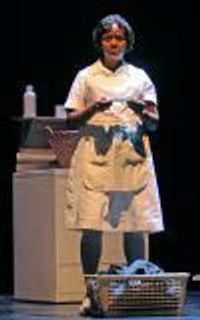Arena Stage "Music Man"-set in the 1930's...
#125Arena Stage
Posted: 5/25/12 at 2:10pmWhy do I picture a steamer trunk and bowl of Japanese goldfish?
blocked: logan2, Diamonds3, Hamilton22
Gaveston2
Broadway Legend Joined: 6/28/11
#127Arena Stage
Posted: 5/25/12 at 2:55pm
Marian is Winthrop's mother? Jesus save me! Later-in-life babies weren't unusual in times when the only commonly available form of birth control was the rhythm method.
Given what the River City matrons make out of nothing, imagine the gossip if Winthrop had been born under suspicious circumstances! No, Mrs. Paroo was very obviously pregnant and gave birth in front of the town doctor or we would hear about it from Mrs. Shinn.
If Marian is Winthop's mother, then the story is about two con-people, not just one. And Harold Hill is redeemed by what, exactly? A liar as crafty as he is?
If SonofRobbiej buys a ticket, he has the right to imagine any old story he likes. Mrs. Shinn is a madam and the Pick-a-little Ladies are really prostitutes (River City being a railroad town and all) who hate Marian because she works at a rival brothel called (wink, wink) "The Library"!
Updated On: 5/25/12 at 02:55 PM
#128Arena Stage
Posted: 5/25/12 at 3:00pm
LOL
Gav, while I'm open to the idea of a darker interpretation, I tend to agree with what you said. Back then, especially in a small town, they wouldn't just shun Marian for having an illegitimate affair and son, they would have run her out of town with tar and feathers faster than Harold Hill. Still, if you shift it to the '30s it would be a more plausible scenario. But in 1912, they would have found a way to close the library, seize her books, run her out of town, and nobody, NOBODY would be taking piano lessons from her. She would have had to move.
blocked: logan2, Diamonds3, Hamilton22
A Director
Broadway Legend Joined: 12/18/07
#129Arena Stage
Posted: 5/25/12 at 3:26pm
In 2009, The Music Man was done at the Oregon Shakespeare Festival directed by the Artistic Director, Bill Rauch. In his program note he wrote, "Chock-full of cultural specificity, the show proves its author does know the territory. It's a time of economic transition, not unlike our own. The traveling salesman will soon be a thing of the past. This adds poignancy to Willson's clever conceit of a conman who embodies the uniquely American archetype. Through Hill, Willson presents us with this paradox: Sometimes the truth is most effectively revealed through deceit.
With this production, we've set out to ask these questions: How is River City transformed by Harold Hill? How is Harold Hill transformed by the community?"
The production was set in 1912. Visually, at the beginning of the show, all the costumes, set pieces props were black and white. Harold Hill was the only character "in color." As the show went on, color was added: first the young people, then the women and then the men. Marion was in black and white until the final moments of Act I. The last character who "added" color was Mayor Shinn. There was a flag pole upstage. At the beginning of the second scene of the show, a man raised a black and white American flag. At the end of the show, the man lowered a red, white and blue flag.
The cast was multi-ethnic: African-American, Asian-American, Hispanic and white. The actor who played Marcellus is deaf. He and Harold signed their exchanges. It was like they had a con man way of talking.
The show began with the train conductor playing the overture on a harmonica. It was a simple way to let the audience know the production was not going to be a big splashy show.
I liked the production so much, I saw it twice. I sort of recall hearing Rauch wanted to make a change in the order of two scenes in the second act. Mrs. Willson said no. On the other hand, she did approve the orchestra reduction to seven musicians. At the beginning of the show, the sound was spare, but as things transformed in River City, the sound grew.
#130Arena Stage
Posted: 5/25/12 at 3:32pmThat's a great concept for the show. Even if it is shamelessly taken from Pleasantville.
#131Arena Stage
Posted: 5/25/12 at 3:38pm
I just want to go on record that I'm not advocating a darker interpretation. This show is a musical comedy and should remain so. But there are small things that bubble under the surface that give weight to the show. I would never want to see it made explicit that Marian is Winthrop's mother. The beauty of it is we don't know. There's something different about this woman...and it doesn't need to be defined for the audience. I'll never forget the day when I had my 'aha' moment about Winthrop's paternity (or is it maternity?). It was a fun little nugget that let me appreciate the show even more than I already did. Of course, I might be entirely wrong. But the show is sophisticated. It's not cornpone, even though that's how it can be played sometimes.
And now I'm going to say something that might be controversial. But I'm an advocate of honoring what's on the page (and all the subtext that can be found within the text). I am not, however, an advocate of honoring a playwright's stated intentions. Simply because I once wrote something and performed it, and someone came up to me to discuss it, going on and on about a certain aspect of the piece. I nodded politely, and accepted what they found. The problem was, I had no idea that this one thing could be interpreted from the piece I wrote. I certainly had no intention of it being there. But, there it was. And I understood why, after it was pointed out to me.
#132Arena Stage
Posted: 5/25/12 at 3:43pm
I was originally going to wait a bit before returning to see this production, but I think I might just go back this weekend. I will be viewing the show from a different perspective (subtext). I really loved reading what people had to say.
SonofRobbieJ, if you do in fact make the trip to DC to see this you have to let me know.
#133Arena Stage
Posted: 5/25/12 at 3:45pmI absolutely will...It will probably be the beginning of July if I do make it!
#134Arena Stage
Posted: 5/25/12 at 3:46pm
Here's a video clip of the production at Oregon Shakespeare Festival that A Director was talking about:
http://www.osfashland.org/plays/video/2009/musicman_popup1.aspx
#135Arena Stage
Posted: 5/25/12 at 4:19pm
Given what the River City matrons make out of nothing, imagine the gossip if Winthrop had been born under suspicious circumstances! No, Mrs. Paroo was very obviously pregnant and gave birth in front of the town doctor or we would hear about it from Mrs. Shinn.
The Paroos weren't River City natives, though. Miser Madison didn't have a friend in that town until SHE came there.
Gaveston2
Broadway Legend Joined: 6/28/11
#136Arena Stage
Posted: 5/25/12 at 4:21pm
Indeed, Best12. And if Marian and her parents had gone out of town for an extended stay and returned with a baby, everyone in River City would have assumed it was Marian's. That would have been true even when I was a kid in the 1960s!
As you say, nobody would have taken piano lessons from Marian after that.
***
Kad, someone from my high school worked on a production of PAINT YOUR WAGON at the U. of Oklahoma that started in black and white, went to color as the mining town prospered, and then went back to B&W as the town failed. That would have been in or about 1970, long before PLEASANTVILLE. So the idea was floating around out there for a long time.
#137Arena Stage
Posted: 5/25/12 at 4:49pm
A Director---thanks so much for posting that.
It's exactly the sort of thoughtfully re-conceived production I wish would end up on Broadway. I would buy a ticket to that in a heartbeat.
blocked: logan2, Diamonds3, Hamilton22
Gaveston2
Broadway Legend Joined: 6/28/11
#138Arena Stage
Posted: 5/25/12 at 4:50pm
Point taken, givesmevoice! I obviously need to dig my copy of the script out of the garage. It was suggested above that Miser Madison was Winthrop's father, but you're thinking, I assume, that the Paroos arrived in town with baby Winthrop and simply told everyone he was Mrs. Paroo's child.
And that's how an out-of-wedlock pregnancy might have been handled in the first decade of the 20th century.
But we see and hear Mrs. Paroo and Marian together in an early scene and Mrs. Paroo sings, "When a woman's got a husband and you've got none, why should she take advice from you, even if you can quote Balzac", etc. Now a baby isn't a husband and Mrs. Paroo is talking about perception, but is that really the way a mother would talk to a daughter who was raising a child as her brother?
Later in the song, Mrs. Paroo accuses Marian of conjuring up an ideal man "out of your Irish imagination, you Iowa stubbornness and a library full of books." The implication is that Marian is inexperienced with men and has unrealistic expectations of them. Not really something you say to a woman who's had a baby. Not that a young mother can't be a dreamer, but we wouldn't accuse her of only knowing men through books.
Again, I support SonofRobbieJ's right to create his own subtext, but to me, Marian-as-Winthrop's-mother creates more problems that it solves. If Marian is innocent of the gossip that she is a loose woman, then her refusal to set the record straight is a matter of stubborn pride and principle; if she has indeed been "loose", then her refusal to defend herself is just latent guilt and far less interesting to me.
One way to see the story is that Marian is slowly corrupted by Harold (she rips a page out of a book, for God's sake!) even as she slowly reforms him. If Marian has already been corrupted in the past, half of the story is lost.
And here's where the setting becomes important: being a single mother in 1912 is to have been corrupted, even though I hope we no longer indulge such ideas today.
#139Arena Stage
Posted: 5/25/12 at 4:58pm
Let me go on record as saying I absolutely love this discussion. It's brought these characters alive for me again and reminded me of how rich they are (were?) to begin with.
Thank you, Meredith Willson, for writing (through eight years and some 40-odd drafts) a brilliant show that still invites speculation, criticism, doubt, and a wealth of possibilities over 50 years after it made its way into the world.
EDIT: Oh, yeah ... and don't forget joy.
blocked: logan2, Diamonds3, Hamilton22
#140Arena Stage
Posted: 5/25/12 at 5:12pm
So here is my problem with the premise of NOT having Marian as Winthrop's mother; then why not cast actresses who are age appropriate to the character.
In reference to the Broadway revival, Rebecca Luker was clearly not even close to 26 years old, and Katherine McGrath was not in her 40s/50s when they played their respective roles. You're asking the audience to suspend belief by accepting these characters as who they are as opposed to who they could otherwise possibly be.
This discussion certainly has made me think about things I hadn't considered, especially about the nature of Miser Madison's relationship with Marian.
Now don't even get me started on Annie Get Your Gun, where a 50+ Bernadette Peters had a kid brother!
#141Arena Stage
Posted: 5/25/12 at 5:20pm
The brilliance of Meredith Willson is that he turns us all into "Pick-a-Little" ladies. It becomes "our business," and we're as bad as they are. A bunch of gossipy hens.
This helps draw us into the Iowans. Without this, its so easy for us to criticize the town folks for their judging and their speculation and their seemingly small minds. We can separate them from ourselves and shake our heads.
But ...
By not giving us the whole story, we are stuck with "chatting" about it and thinking about it, until our heads lean forward and we pick the seed right off of the ground and cluck at the same time.
That's our connection to the citizens. We're no better (or worse) than they are.
EDIT: The best part of The Music Man is that it not only allows us to laugh at and celebrate these River City---ziens ... it allows us to laugh at and celebrate ourselves.
blocked: logan2, Diamonds3, Hamilton22
Gaveston2
Broadway Legend Joined: 6/28/11
#142Arena Stage
Posted: 5/25/12 at 5:25pm
I agree, Best12, and I think THE MUSIC MAN is about something a lot deeper than ice cream socials: it's about the very nature of faith and hope (without the usual layer of religious dogma).
I would even go one step further, Best12, and say devices such as turning the town council into a barbershop quartet predict the so-called "concept musical" that was to come 10 years later.
No, THE MUSIC MAN isn't COMPANY, nor does it try to be. But it's a lot more inventive than most WEST SIDE STORY fans will admit.
#143Arena Stage
Posted: 5/25/12 at 5:28pm
I don't mean to pit this show against West Side Story. I have just as many superlatives for that show as I do for this one.
And I really would love to see a "reinvigorated" revival of Music Man on Broadway again.
What I don't want to see is another candy-colored, Lawrence Welk Dinner Theatre version.
They oughta be tarred and feathered.
blocked: logan2, Diamonds3, Hamilton22
#144Arena Stage
Posted: 5/25/12 at 5:29pmIronically B12B, the pick-a-little song mixed with Goodnight Ladies, is my favorite song!
#145Arena Stage
Posted: 5/25/12 at 5:41pmKate's Marion was pretty clear: Uncle Maddie was her father's best friend. He wasn't extravagant and he saved his money to put only to good use. He died within 2 years of Hill's arrival and apparently after mr. Paroo making Winthrop 8 or so. "he never had a friend in this town until she came here.". When Kate was asked about Winthrop possibly being her child she debunked first with facts. Then she said in her back story she read to him as he lay dying as one would a father's old friend and for that he left her the books so shed have a way to help out the family financially. Actually, perhaps all art and giving died with him. As for innocence, there was sl some in the 1930s. Remember The Wizard of Oz?
#146Arena Stage
Posted: 5/25/12 at 5:43pm
"Remember The Wizard of Oz?"
Nope. Never heard of it.
blocked: logan2, Diamonds3, Hamilton22
jimmycurry01
Broadway Legend Joined: 5/28/05
#147Arena Stage
Posted: 5/25/12 at 6:13pmI just want to say, this has been my favorite discussion I have ever read here on BWW.
#148Arena Stage
Posted: 5/25/12 at 7:31pm
Now don't even get me started on Annie Get Your Gun, where a 50+ Bernadette Peters had a kid brother!
Someone addressed that in their review for the LuPone Annie Get Your Gun at Ravinia by saying that there's no reason those children couldn't be Annie's. It would kind of fall in line with the character if she was trying to pull the wool over everyone's eyes.
Also they could always be her half-siblings on the father's side, since men can father children forever.
#149Arena Stage
Posted: 5/25/12 at 7:43pm
If you know the real Annie Oakley's past ... she was repeatedly molested by her father. When her mother found out, she left her out in the snow to die.
Fun musical fact.
blocked: logan2, Diamonds3, Hamilton22
Videos





